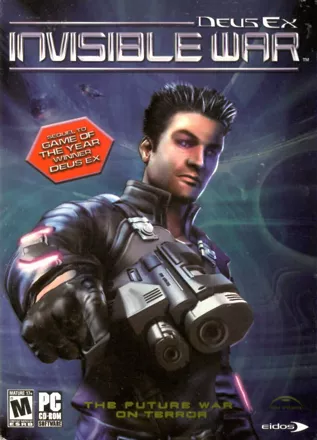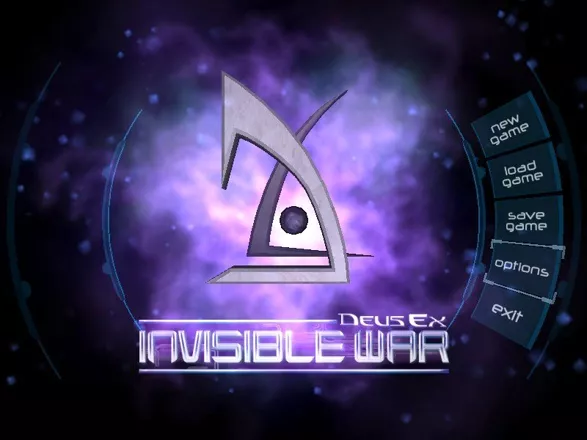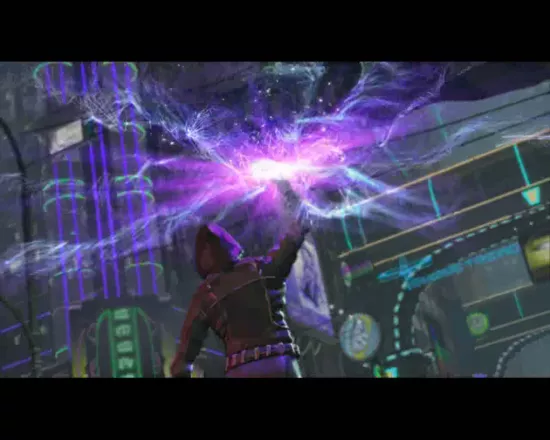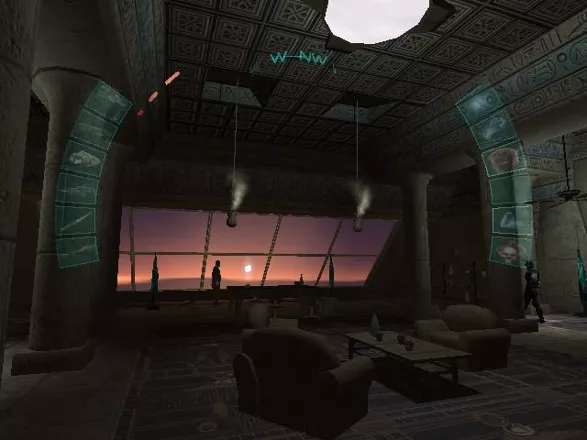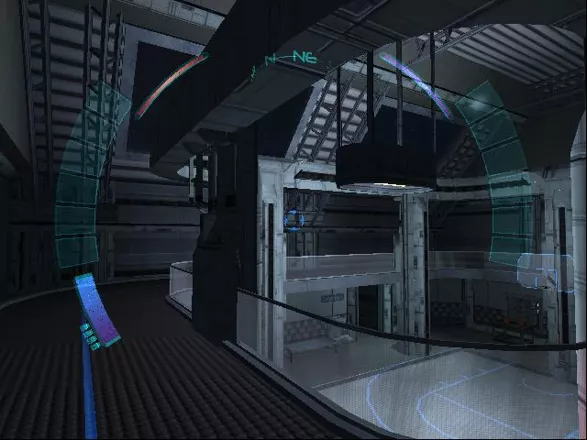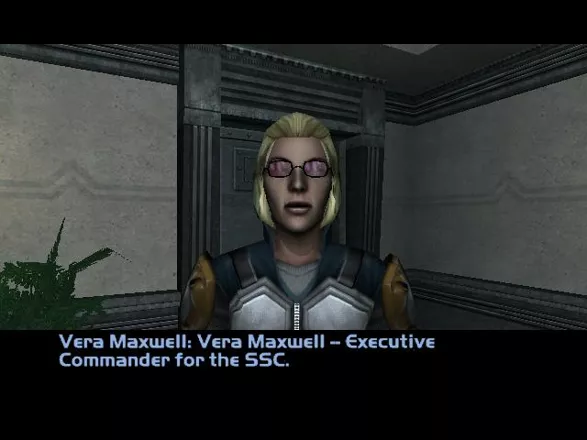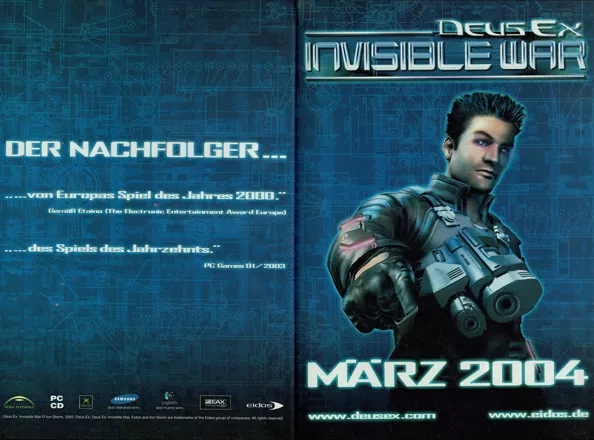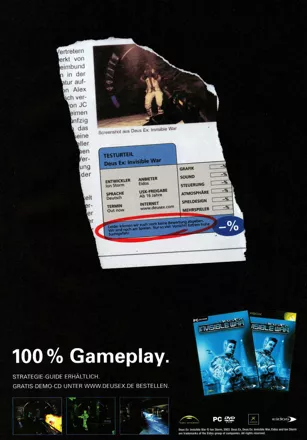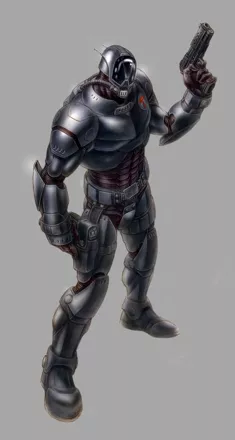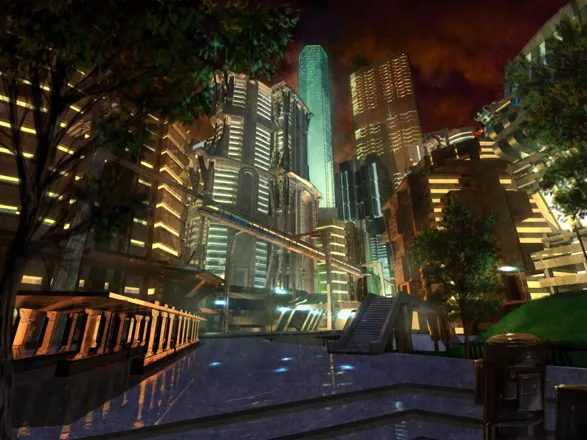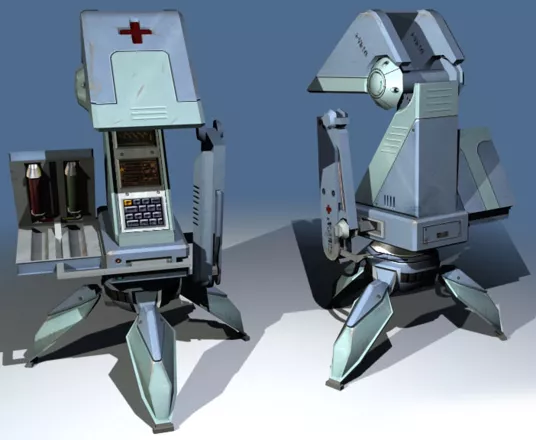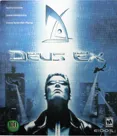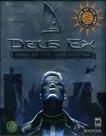Deus Ex: Invisible War
Description official descriptions
Twenty years have passed after the events described in Deus Ex. The actions of JC Denton have eventually led to a period of economic depression, known as "The Collapse". The world is on the brink of chaos after the dismantling of the mighty biotech corporations, and multiple religious and political groups lust after power.
The city of Chicago is destroyed in a devastating energy blast by unknown terrorists. Two trainees of the Tarsus Academy, Alex D and Billie Adams, are evacuated to another Tarsus-controlled facility in Seattle. Shortly thereafter the facility is attacked by members of a religious organization called the Order. Billie admits that she has been collaborating with them, implying that Tarsus may be involved in a conspiracy. It is now up to Alex to find his or her place in the new world, and ultimately shape its fate.
Deus Ex: Invisible War is a first-person shooter that retains many gameplay elements of its predecessor, such as conversations with characters, inventory management, exploration, and mixing various gameplay styles during missions. As in the original game, the style of play helps shape the game as it progresses, from how characters interact with the protagonist to the types of situations encountered. Each potential conflict can be resolved in a number of ways, through peaceful means or through violence, using stealth or a show of force. Hacking computer terminals and unlocking doors with special tools are prominently featured.
Weapons can be modified in a variety of ways, e.g. increasing their rate of fire, silencing the shots, allowing the weapon to shoot through glass, etc. Characters can once again outfit their bodies with an array of biotech parts, some of which include the ability to see through walls, disappear from radar, regenerate from critical hits, or jump forty feet in the air. Unlike the previous installment, there are no true role-playing elements in the game. The player must search for biotech canisters to install and upgrade biomods; however, no experience points are awarded for either completing missions or dealing with enemies. Inventory management has been simplified as well.
The sequel places more emphasis on decisions and different approaches to missions. From the beginning of the game the player has the freedom of performing missions for organizations and people of his or her choice. Like in the first game, several endings can be reached depending on the player's decisions.
Spellings
- 杀出重围:隐形战争 - Simplified Chinese spelling
- 駭客入侵 - Traditional Chinese spelling
Groups +
- 3D Engine: Unreal Engine 2
- Console Generation Exclusives: Xbox
- Deus Ex series
- Gameplay feature: Multiple endings
- Games with 451
- Green Pepper releases
- Middleware: Bink Video
- Middleware: FaceFX
- PC Gamer Presents games
- Physics Engine: Havok
- Protagonist: Cyborg
- Protagonist: Female (option)
- Setting: Arctic / North Pole
- Setting: City - Cairo
- Setting: City - Chicago
- Setting: City - New York
- Setting: City - Seattle
- Software Pyramide releases
- Theme: Hacking / Pseudohacking
- Theme: School
Screenshots
Promos
Videos
Add Trailer or Gameplay Video +1 point
See any errors or missing info for this game?
You can submit a correction, contribute trivia, add to a game group, add a related site or alternate title.
Credits (Windows version)
276 People (233 developers, 43 thanks) · View all
| Studio Director | |
| Project Director | |
| Executive Producer | |
| Producer | |
| Associate Producer | |
| Lead Programmer | |
| Programmers | |
| Additional Programming | |
| Director of Technology | |
| Lead Technology Programmer | |
| [ full credits ] | |
Reviews
Critics
Average score: 79% (based on 64 ratings)
Players
Average score: 3.4 out of 5 (based on 152 ratings with 16 reviews)
The Good
After the global Collapse, the WTO established safe enclaves for the best and brightest citizens of the world. In these enclaves commercialism flourishes. WTO troops and private sector security forces guard commercial and housing districts, while corporations have free reign to raise and educate their future employees. But all is not well. The Order Church have stepped up their anti-WTO activities. Chicago is decimated by a nanotech bomb, an Arcologist compound in Cairo is under siege, and the Panzerwerks factories are crippled by saboteurs. And lurking in the background is the revitalized Knights Templar, whose neo-luddite rhetoric has taken on religious fervor.
Deus Ex: The Invisible War begins with an Order raid on a Tarsus Academy in Seattle. The player’s character, Alex D—a Tarsus student, finds him- or herself under fire and unable to trust the WTO structure he’s been raised in. While the Order is clearly in the wrong, events suggest that Tarsus had ulterior motives regarding his education. Alex finds himself pulled between the WTO and the Order, with both sides recruiting his friends and attempting to sway his opinion. Starting in Upper Seattle, the player is quickly immersed in the gray morality that is the world of Deus Ex.
Invisible War is an action RPG presented from an FPS perspective. The game presents the player with a series of choices in terms of quests and goals. The choices are often conflicting and usually weigh a stack of credits against Alex’s code of ethics. The owner of a nightclub will want someone killed but the mark could double your money. Killing a fighting greasel might improve your gambling luck. Small choices lack the larger repercussions found in the original game, but you can cater to the several factions vying for your favor.
While much of the game can be played over the barrel of the gun, stealthy players can complete the game with few, if any, kills. Like its predecessor, Invisible War is customizable. Through the use of legal and black market biomods, players can upgrade their character, concentrating on creating a covert ops hacker or a killing machine. Basic upgrades allow for health regeneration, increased strength, and increased speed. Illegal modifications let players hack ATMs, take control of security turrets, and drain life from unconscious enemies.
Invisible War doesn’t have to be combat intensive, but there is a decent amount of weaponry to be found. Ranged weapons include the typical lethal pistols, sniper rifles, and rocket launchers. A poisoned dart boltcaster can knock out opponents from a distance. You can get up close and personal with a combat knife, energy sword, or various baton types. There is also a wide array of explosives for various user needs.
Of note, all projectile weapons draw from the same ammunition pool, but at a different rate. So you might not be able to send any more rockets flying at a Templar in full armor, but you can switch over to the pistol and fire off a few more rounds. Weapons can also be modified, but can only take two upgrades and can’t be downgraded if you change your mind.
The world of Deus Ex is still populated with interesting characters, some of whom return from the original game. The world is littered with books and datacubes, coming nowhere near Morrowind’s word count, but still filling in the gaps and explaining things like why all guns take the same ammunition. This entry has fewer locations than the original (and smaller levels), but there is still a bit of globetrotting to be done.
The Bad
Invisible War, aside from its weaknesses as a Deus Ex game, is a fun, largely open-ended excursion. Its ten hour playtime doesn’t provide enough time to develop characters or explore the storyline and players just coming to the franchise might prefer if characters just shut up rather than droning on about myriad conspiracies and organizations. Still there’s a lot to like here.
Most of what I didn’t like involved design choices. The HUD is clunky and crowded. Resembling an iris, good chunks of Alex’s peripheral vision are taken up with inventory and biomod information. You still have to enter an inventory screen to manage inventory, so it really isn’t time saving—especially since you can use the scroll wheel to move through active inventory items.
Levels look similar regardless of where they are geographically. I guess the proliferation of WTO technology is part of the problem, but I was really dying for something organic towards the game’s end.
Finally, aside from a rendered opening and four rendered endings, nothing happens outside of a game level—i.e., taking a helicopter from Cairo to Trier means clicking on a helicopter in Cairo and then magically showing up in Trier. A few transitional scenes would have been nice.
The Bottom Line
There’s an interesting conspiracy theory that Invisible War is smaller, simpler, and shorter than the original in an effort to make it more console-friendly. I’m not sure I buy it, but you have to wonder: in an age when sequels are bigger and better, why is Invisible War so scaled-down?
Let me step back, when I first played Deus Ex I was singularly unimpressed. As a first-person shooter, it was just average and lacked any sort of robust AI. As a first-person sneaker, I much preferred the Thief series. What I liked on my first play through, was the amount of character customization and the conversation options. And the fact that I had choices to make. Choices that seemed to matter.
The second time I played Deus Ex, I realized how brilliant the game was. Based on the choices your character makes, killing Anna early on or saving Paul, the game feels completely different. There’s an incredible level of branching, which I missed the first time out.
Back to Invisible War, I’m not sure that anything I did, up until the last half hour of gameplay, had any real effect. It’s that last half hour that determines which of the four endings you’ll get. Unfortunately, the previous 9-1/2 hours haven’t directed you towards any particular outcome. Are the Illuminati better than the Templars? Is the WTO’s vision of utopia more convincing than ApostleCorps’? Does any of it really matter?
Windows · by Terrence Bosky (5397) · 2005
A shorter, prettier, simpler extension of a great game with all the same flaws as the original.
The Good
Ok, let's have it first. The graphics are incredible. This is a complicated statement (Read below) but I managed to get it to work smoothly at 1024 and wow. It's gorgeous. The lighting is good, although they frequently show off their engine. I constantly found myself walking just so that the world would go by slower.
The sound likewise is great. I feel the music was better in the first game. That said, there's nothing wrong with this game's sound. The effects are great, though at times a touch odd (e.g. your gun "beeps" when you draw it). The audio is very immersive as well. As always, I recommend playing this game on a set of good headphones.
The combined ammo is a nice touch, as is the design of the biomod system. It tends to prevent you creating as powerful character as you could make in the original.
The plot is also great, although much shorter than the first. I was expecting 15 hours or so and I got 10. There is great replay to this game, however, since quests are often mutually exclusive and you can re-customize your biomods. The nods to the first game are also a cool feature.
It is a slick, engaging, immersive, graphically incredible romp through a conspiracy theorist's dreams.
The Bad
It is marred by the same problems the original had, and one more major new problem.
Much as in the original, the AI is stupid. Not only that, but strange events seem to happen sometimes that cause NPC's to switch allegiances. Nothing a re-load won't cure, but it's noisome.
Also as in the original, the environments are somewhat drab. I don't hold as negative opinion as PC Gamer or gamespot do, I'd note the antarctica section as a good exception to this. That said, blue and gray tend to dominate the color palette in this game.
A MAJOR flaw with this game is performance. Many users with HUGE systems have trouble running this game at 800x600 smoothly with all graphical options off. This is after a patch. I by some strange coincidence managed to get it to run at 1024 with a great framerate, even though my system is a year old or so. Clearly that's not how it's supposed to work.
The Bottom Line
Overall, the weaknesses are offset by the strengths, though not nearly so much as in the first game. This game has all the flaws of the first game as far as graphical listlessness and AI go, but non of great RPG elements that made the first so fun. I would recommend this game, but not with nearly the strength I do the first Deus Ex. It could have been so much better.
Windows · by Marty Bonus (39) · 2004
Heavily underrated, but not as good as the original
The Good
Unlike the original Deus Ex, this game starts pretty interesting right from the start, and then as it gets more and more complicated and everyone turns their right face in the grand final, it turns out to be just another regular sequel with nothing new to offer but graphical goodies due to a time difference. However, this game holds a strong point over its originator, and that is that certain places are so well made it almost reaches the worlds created in Anachronox in its intriguing exploration and citizens. Well, far from Anachronox, but still, it poses a touch of creative design.
Unlike what other have said, I find the graphics to be quite good (after seeing how character looked in original, I can't say I expected them to be anything too great, but they are fine nonetheless), and game does support higher resolutions, so whether this is an Xbox port or not, it may be questionable. Whereas Deus Ex put you in a role of JC Denton without giving you so open choice over your freedom, this game quite vividly forces you vast selection of choices on every corner. It is neat to pretend to work for everyone's cause yet working against them all, while still trying to spare certain people you may care about to stay alive.
Physics are something I totally forgot from the first game. I expected that from Half-Life 2, but never have I thought they'll be so cool to utilize in here. I remember how cool it was the fact you could carry enemy soldiers and put them somewhere in the shadows or such unspottable places, but here, you can toss them further than those guys toss discs and spears on the olympics. The whole tossing issue puts a great deal of fun to this title, and it's done pretty well. This is definitely a much more interesting game then I ever imagined it'll be due to all those cons, it's as addictive to rid me of my sleep for the past couple of days, really driving you on.
The Bad
JC Denton looks like crap in here, I sure don't remember him like that. Not just his attitude because he's merged with Helios now, but the whole extern appearance.
Also, there's a crappy bug about the savegames, I reached the ending map, just to later figure that savegame can sometimes be buggy and drops you right back at your desktop, so had to replay the past four hours since the previous valid savegame file. Tsk tsk tsk, seems they had some serious lacks in the code, and the sound starts to crackle after some time, maybe it's not their fault, but of Microsoft's DirectX, so I guess I should look pass it, it wasn't the first game to have sound problems like that.
Also, there is some serious AI balance on the loose. For example, certain leader and his surrounding troops are not firing at me, but any other of his will be. Kinda weird to take it serious when he asks from my allegiance then, wouldn't you say? Also, there was a scene when some bum accidentally caught a fire and started yelling and running all in flames. Soon after, one bumped into another, and then that one into the third one, and they were all on fire. Kinda strange to observe, so I didn't have a choice but to put their pain to an end with a bullet through each one's head. Also, it's not good when nearby people won't talk with you after some shootout, they seem either to be afraid or just want to relax for some time but, it's strange, and not likely, especially if they're on your side and even more, if you came to rescue them.
The Bottom Line
All in all, very addictive game from the moment you start playing it. It made me appreciate a PC after long period of time of preferring console games. Sure, this game exists for Xbox as well, but still, it just ain't the same feeling, not to me anyway. Deus Ex and Deus Ex: Invisible War are two great games on their own that deserve a certain percentage of respect no matter the odds, and they aren't just a mindless shooters in a true sense of FPS way, so you guys stalking over another masterpiece called Half-Life, don't go into playing these games unless you're ready for some dialogues and a bigger story.
Windows · by MAT (240793) · 2012
Discussion
| Subject | By | Date |
|---|---|---|
| It's not that bad! | Unicorn Lynx (181780) | Sep 15, 2011 |
| Screenshots | Cantillon (76856) | Sep 8, 2011 |
| Dynamic Lighting | St. Martyne (3648) | Nov 15, 2008 |
Trivia
Basketball
Continuing the Warren Spector tradition, Invisible War features a basketball court. It's right at the beginning of the game and there's no missing it; one of your mandatory objectives will send you through there.
Engine
Ion Storm licensed the Unreal engine and heavily modified it for this game. Its a inhouse engine with a tiny bit of Epic's Unreal code left in. It is said that the engine programmer left mid-development with a largely undocumented code which caused the game's numerous technical problems.
Music
In order to bring popstar NG Resonance's music to life, Eidos licensed a few tracks from the industrial/techno band "Kidney Thieves". Said tracks can be found in their Trickstereprocess album. The original soundtrack for the game on the other hand, can be downloaded for free on Eidos's site.
References
The coffee shops, Pequod's, and QueeQueg's are from Moby Dick. The Pequod, was the name of the ship. QueeQueg is the Indian harpooner.* In the abandoned curio shop over the 9 World Taverns, you can find a book containing text on the care and cleaning of Ohio State Bobbleheads. Chris Carollo, the lead programmer for Invisible War is an Ohio State alumni. * The Tarsus Academy shares a name with the city that was the birthplace of Paul, the apostle. Paul Denton acts as the apostle for J.C. Denton.
Awards
- 4Players
- 2004 – Best Console Story of the Year
- GameSpy
- 2003 – #7 Game of the Year
- 2003 – #3 Xbox Game of the Year
- 2003 – #5 PC Game of the Year
- GameStar (Germany)
- Issue 04/2009 - One of the "10 Most Terrible Sequels" (It is a good game in its own right but it changes everything which made Deus Ex big for the worse, e.g. exciting story, clever level design, RPG elements and freedom of decision.)
Information also contributed by MasterMegid, Scott Monster and Zovni
Analytics
Upgrade to MobyPro to view research rankings!
Related Sites +
-
Deus Ex 2
Official Web Site -
Deus Ex: Invisible War Post-Mortem
Warren Spector and Harvey Smith speak about the development and shortcomings of Deus Ex: Invisible War (Youtube) -
Hi-Res Textures for Deus Ex: Invisible War
Download a pack containing hi-res replacement textures for the game. -
Kidney Thieves official site
Site of the industrial/techno band Kidney Thieves, who contributed to Invisible War's soundtrack.
Identifiers +
Contribute
Are you familiar with this game? Help document and preserve this entry in video game history! If your contribution is approved, you will earn points and be credited as a contributor.
Contributors to this Entry
Game added by Jeanne.
Xbox added by Jason Walker.
Additional contributors: xroox, Zovni, Unicorn Lynx, Shoddyan, Paulus18950, Patrick Bregger.
Game added December 6, 2003. Last modified March 19, 2024.
